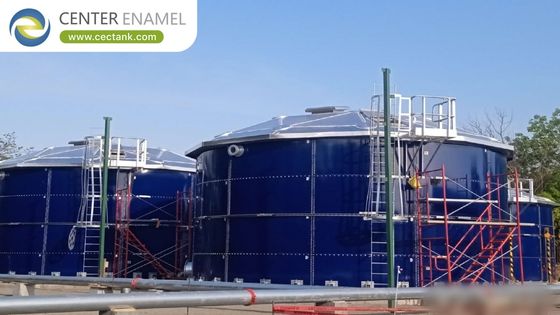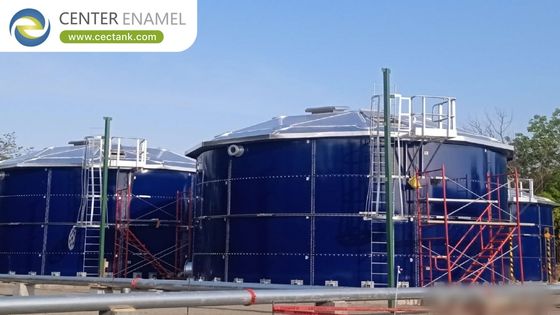-
유리 가 강철 탱크 에 녹여 (465)
-
스테인레스강 탱크 (434)
-
퓨젼은 에폭시 탱크를 계약했습니다 (469)
-
진료 철강 탱크 (321)
-
알루미늄 돔 지붕 (1257)
-
폐수 저장 탱크 (226)
-
용접된 철강 탱크 (457)
-
압력 용기 (295)
-
무산소 다이제스터 (201)
-
산업적 저수 탱크 (349)
-
유리로 덮인 강철 탱크 (180)
-
볼트로 체결된 강제 탱크 (270)
-
슬러지 저장 탱크 (115)
-
바이오가스 저장 탱크 (173)
-
용매 저장 탱크 (133)
-
농업용 물 저장 탱크 (179)
-
화재 물 탱크 (166)
-
곡물 저장실 (146)
-
바이오 가스 프로젝트 (381)
-
폐수 처리 프로젝트 (270)
-
이중막 지붕 (223)
|
상세 정보 |
|||
제품 설명
항공 연료 탱크용 플로팅 루프: 오염 및 증발 손실 방지
의 저장항공 연료는 안전, 품질 및 환경 보호에 대한 최고 수준을 요구하는 중요한 임무입니다. 고가치 및 휘발성 제품인 항공 연료는 항공기의 안전하고 안정적인 작동을 보장하기 위해 오염으로부터 보호하고 증발을 방지해야 합니다. 사소한 오염 물질의 존재나 연료 구성의 변화조차도 치명적인 결과를 초래할 수 있습니다. 이러한 엄격한 요구 사항을 충족하기 위해플로팅 루프 탱크는 업계에서 선호하는 솔루션입니다. 연료 표면에 직접 놓이는 불침투성 장벽을 만들어 이러한 탱크는 증기 공간을 제거하여 증발을 대폭 줄이고 오염을 방지하며 항공 연료가 깨끗한 상태로 제공되도록 합니다. 플로팅 루프 탱크는 전문적인 엔지니어링이 글로벌 운송 안전 및 운영 우수성에 직접적으로 기여하는 강력한 예입니다.
제품 특징 및 장점
플로팅 루프 탱크의 개념은 기존의 고정 루프 탱크에 존재하는 위험한 증기 공간을 제거하는 것입니다. 플로팅 루프는 저장된 액체 표면에 직접 놓이는 물리적 구조입니다. 탱크의 액체 수위가 올라가거나 내려가면 루프가 함께 움직입니다. 이 설계는 연료가 대기와 직접 접촉하는 것을 방지하여 휘발성 성분의 증발과 오염 물질의 유입을 모두 방지하는 데 중요합니다.
이 기술은 항공 연료 저장에 몇 가지 주요 이점을 제공합니다.
오염 방지: 플로팅 루프는 먼지, 습기 및 이물질과 같은 외부 오염 물질에 대한 강력한 장벽 역할을 합니다. 이는 항공 연료에 매우 중요하며, 이물질은 필터를 막거나 엔진을 손상시켜 안전 문제를 일으킬 수 있습니다.
증발 손실 감소: 플로팅 루프는 증기 공간을 제거하여 연료의 휘발성 성분이 증발하여 빠져나가는 것을 방지합니다. 이는 제품 손실을 크게 줄이고 특히 대규모 공항 연료 농장에서 상당한 경제적 이점으로 이어집니다.
안전성 향상: 플로팅 루프의 가장 중요한 안전 이점은 증기 공간을 제거하는 것입니다. 이 공간이 없으면 점화 가능한 증기-공기 혼합물이 없어 화재 및 폭발에 대한 중요한 안전 계층과 위험 완화를 제공합니다.
연료 무결성 유지: 플로팅 루프가 제공하는 지속적인 밀봉은 연료가 산소에 노출되는 것을 방지하여 장기간 저장 기간 동안 연료의 화학적 조성과 품질을 유지하는 데 도움이 되며 모든 규제 표준을 충족하는지 확인합니다.
제품 응용 분야
플로팅 루프 탱크는 매우 다재다능하며 항공 및 에너지 부문에서 다양한 응용 분야를 찾습니다. 오염을 최소화하고 순도를 보장하는 것이 필수적인 휘발성 액체를 저장하는 데 선호되는 선택입니다. 다음과 같은 용도로 널리 사용됩니다.
항공 연료 탱크: 공항 연료 농장, 군사 기지 및 연료 터미널을 위해 특별히 설계되어 제트 연료 및 기타 항공 연료를 최고 품질로 저장합니다.
정제 석유 제품: 정유소 및 유통 센터에서 가솔린 및 디젤과 같은 광범위한 석유 제품을 대기 노출로부터 보호하여 무결성을 유지하는 데 필수적입니다.
원유 저장: 대규모 저장 터미널에서 대량의 원유를 관리하여 증기 배출을 줄이고 가연성 증기의 축적을 방지하는 데 사용됩니다.
산업용 오일 탱크: 다양한 산업 환경에서 오일 및 윤활유의 순도를 유지하여 기계를 오염으로부터 보호하고 안정적인 공급을 보장하는 데 사용됩니다.
회사 장점
Center Enamel은 저장 탱크 업계의 선두 주자로 인정받고 있습니다. 당사의 품질에 대한 약속은 ISO 9001 및 EN1090를 포함한 국제 표준을 준수하는 엄격한 제조 공정을 통해 강조됩니다. 당사의 전담 R&D 팀은 기술을 지속적으로 혁신하여 당사의 탱크가 업계의 최전선에 있도록 보장합니다. 당사는 초기 엔지니어링 컨설팅 및 맞춤형 설계에서 효율적인 현장 설치 및 글로벌 A/S 지원에 이르기까지 모든 고객을 안내하는 포괄적인 "Full Chain Service"를 제공합니다. 이러한 통합 접근 방식은 원활한 프로젝트 경험과 내구성이 뛰어나고 성능이 우수한 최종 제품을 보장합니다.
회사 사례 연구
다음 사례 연구는 Center Enamel의 기술 능력과 다양한 프로젝트 경험을 보여줍니다. 이러한 특정 프로젝트의 기술은 논의된 플로팅 루프 탱크와 다르지만, 광범위한 산업 및 환경 응용 분야에 대한 맞춤형 격리 솔루션을 제공하는 회사의 광범위한 전문 지식을 보여줍니다.
사례 1: 에스와티니의 산업 폐수 처리
에스와티니의 알코올 폐수 처리 프로젝트는 유출수의 부식성이 높은 특성을 견딜 수 있는 강력한 격리 시스템을 필요로 했습니다. 고객은 처리 공정에 대한 내구성이 뛰어난 솔루션이 필요했습니다. 이 프로젝트에는 우수한 내식성과 긴 작동 수명을 위해 선택된 여러 Glass-Fused-to-Steel 탱크의 설치가 포함되어 회사가 까다로운 산업 폐기물 관리 프로젝트를 처리할 수 있는 능력을 보여주었습니다.
사례 2: 구이저우성 음식물 쓰레기 처리
구이저우성에서 음식물 쓰레기 처리 프로젝트가 시립 음식물 쓰레기를 처리하기 위해 설립되었습니다. 이 프로젝트는 소화조 내용물의 부식성 특성과 오래 지속되고 유지 보수가 적은 솔루션의 필요성과 관련된 문제에 직면했습니다. 팀은 화학적 공격에 대한 탁월한 저항력과 빠르고 효율적인 구축을 가능하게 하는 모듈식 설계를 위해 Glass-Fused-to-Steel 탱크를 선택했습니다. 그 이후로 탱크는 안정적인 격리 솔루션을 제공하여 공장이 일관된 바이오가스를 생산하고 폐기물을 효과적으로 관리할 수 있도록 했습니다.
사례 3: 싱가포르의 바이오가스 엔지니어링
싱가포르의 바이오가스 프로젝트는 다양한 유기성 폐기물을 에너지로 전환하기 위해 개발되었습니다. 이 시설은 소화조 내용물의 부식성 특성을 처리하고 혐기성 소화를 위한 안정적이고 기밀한 환경을 제공할 수 있는 격리 솔루션이 필요했습니다. 팀은 화학적 공격에 대한 탁월한 저항력과 빠르고 효율적인 구축을 가능하게 하는 모듈식 설계를 위해 Glass-Fused-to-Steel 탱크를 선택했습니다. 그 이후로 탱크는 안정적인 격리 솔루션을 제공하여 공장이 일관된 바이오가스를 생산할 수 있도록 했습니다.
결론
플로팅 루프 탱크는 현대 항공 연료 저장의 필수 구성 요소입니다. 오염을 방지하고 증발 손실을 줄이며 안전성을 향상시키는 능력은 기존 저장 방식보다 우수한 솔루션입니다. 대기 노출에 대한 안정적인 장벽을 제공함으로써 플로팅 루프는 항공 연료가 깨끗한 상태를 유지하여 글로벌 운송을 보호하고 운영 우수성을 촉진합니다. 항공 산업이 안전, 품질 및 지속 가능성을 계속 우선시함에 따라 플로팅 루프 탱크와 같은 고성능 격리 솔루션에 대한 수요는 계속 증가할 것입니다.




